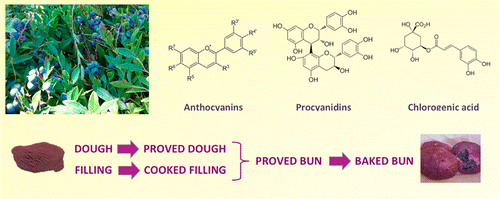Baking blueberries changes their polyphenol content—and possibly their health benefits

Blueberries are called a "superfood" for their high polyphenol content, but when served as warm, gooey pie filling or when lending bursts of sweet flavor to a muffin, their "super" health benefits change. Scientists studied how cooking and baking affect the increasingly popular fruit's polyphenols and reported their mixed findings—levels of some of these substances rose while others fell—in ACS' Journal of Agricultural and Food Chemistry.
Ana Rodriguez-Mateos and colleagues note that eating blueberries is associated with several health perks including improved thinking, reduced risk for heart disease and reduced inflammation. Research suggests that a set of natural plant compounds called polyphenols lend the fresh fruit these benefits. But consumers don't always enjoy blueberries raw. Some methods of processing, such as juicing and canning, lower polyphenol levels by 22 to 81 percent. However, no studies have tested whether using blueberries in breads, muffins or pies affects their polyphenol content. Rodriguez-Mateos' team sought to test the stability of these health-promoting compounds during cooking, proofing (when the dough rises before cooking) and baking.
They found that all three processes had mixed effects on blueberries' polyphenols including anthocyanin, procyanidin, quercetin and phenolic acids. Anthocyanin levels dropped by 10 to 21 percent. The levels of smaller procyanidin oligomers got a boost while those of the larger ones dipped. Phenolic acid levels increased. Other compounds such as quercetin remained constant. They say that the good retention of polyphenols observed in their study might be due to the use of yeast, which may act as a stabilizing agent during baking. "Due to their possible health benefits, a better understanding of the impact of processing is important to maximize the retention of these phytochemicals in berry-containing-products," the researchers state.
More information: "Impact of Cooking, Proving, and Baking on the (Poly)phenol Content of Wild Blueberry" J. Agric. Food Chem., Article ASAP DOI: 10.1021/jf403366q
Abstract
Accumulating evidence suggests that diets rich in (poly)phenols may have positive effects on human health. Currently there is limited information regarding the effects of processing on the (poly)phenolic content of berries, in particular in processes related to the baking industry. This study investigated the impact of cooking, proving, and baking on the anthocyanin, procyanidin, flavonol, and phenolic acid contents of wild blueberry using HPLC with UV and fluorescence detection. Anthocyanin levels decreased during cooking, proving, and baking, whereas no significant changes were observed for total procyanidins. However, lower molecular weight procyanidins increased and high molecular weight oligomers decreased during the process. Quercetin and ferulic and caffeic acid levels remained constant, whereas increases were found for chlorogenic acid. Due to their possible health benefits, a better understanding of the impact of processing is important to maximize the retention of these phytochemicals in berry-containing products.
Journal information: Journal of Agricultural and Food Chemistry
Provided by American Chemical Society



















